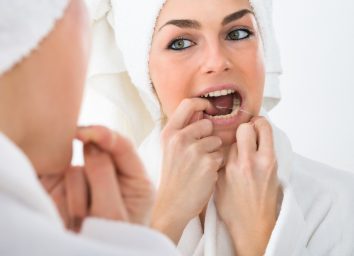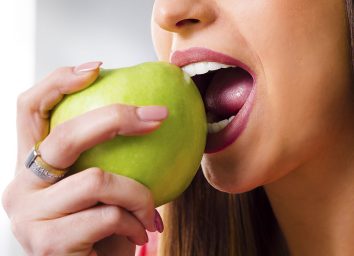The Best and Worst Foods for Your Oral Health, Say Experts

When we think of our health, we don’t spend nearly enough time thinking about our mouths—and we should! Not only is it an aesthetic concern to keep your teeth pearly white and your breath minty fresh, but good oral health can have beneficial effects on your overall health in general, not the least of which is preventing heart disease.
With all of these concerns in mind, here are the foods that will help you keep your teeth, gums, and mouth healthy and strong, and the worst oral health culprits, too. While you’re making healthier choices, be sure to stock up on The 7 Healthiest Foods to Eat Right Now.
First up, the best foods for oral health.
Eggs
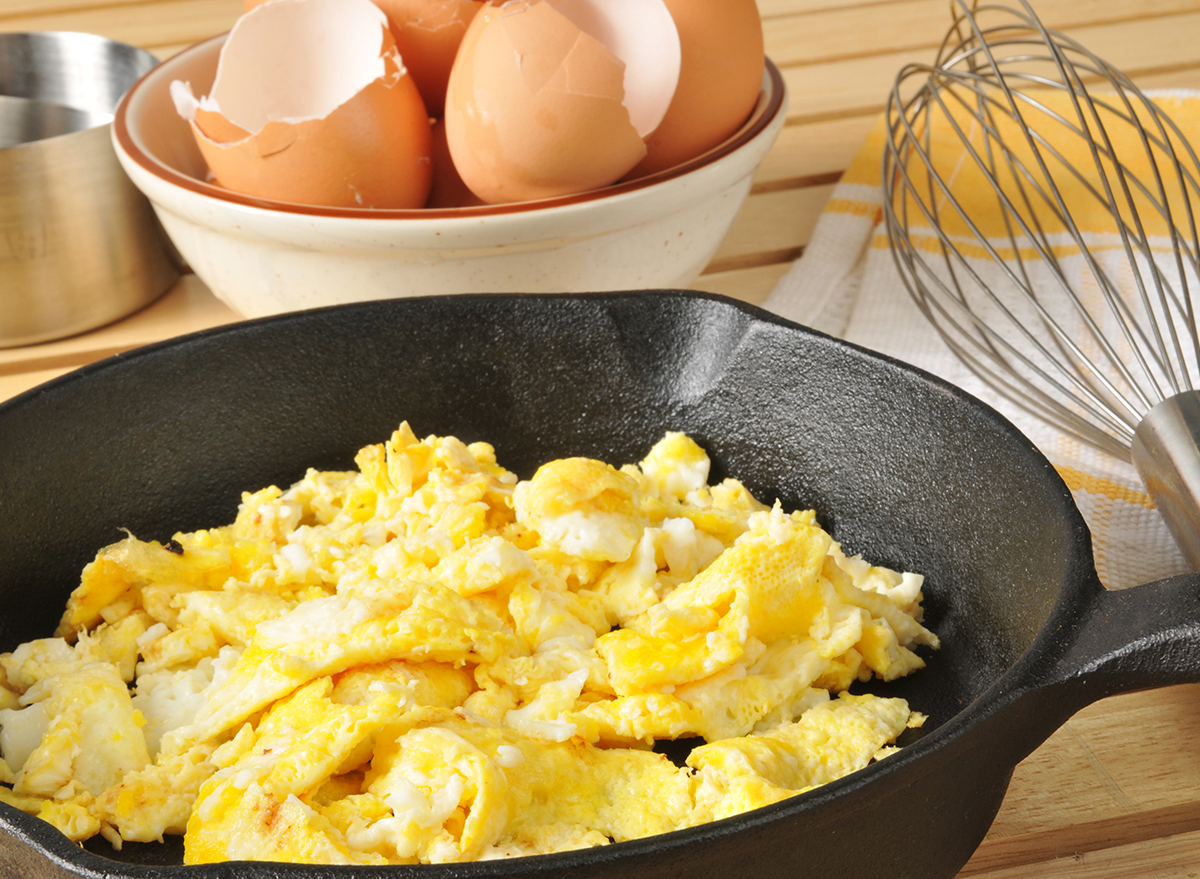
Eggs are great for oral health, explains SmileDirectClub’s Chief Clinical Officer Dr. Jeffrey Sulitzer, DMD, as they are rich, not only in calcium, but in vitamin D, which helps the body absorb calcium and phosphate. These minerals are essential for building and protecting tooth enamel.
Yogurt
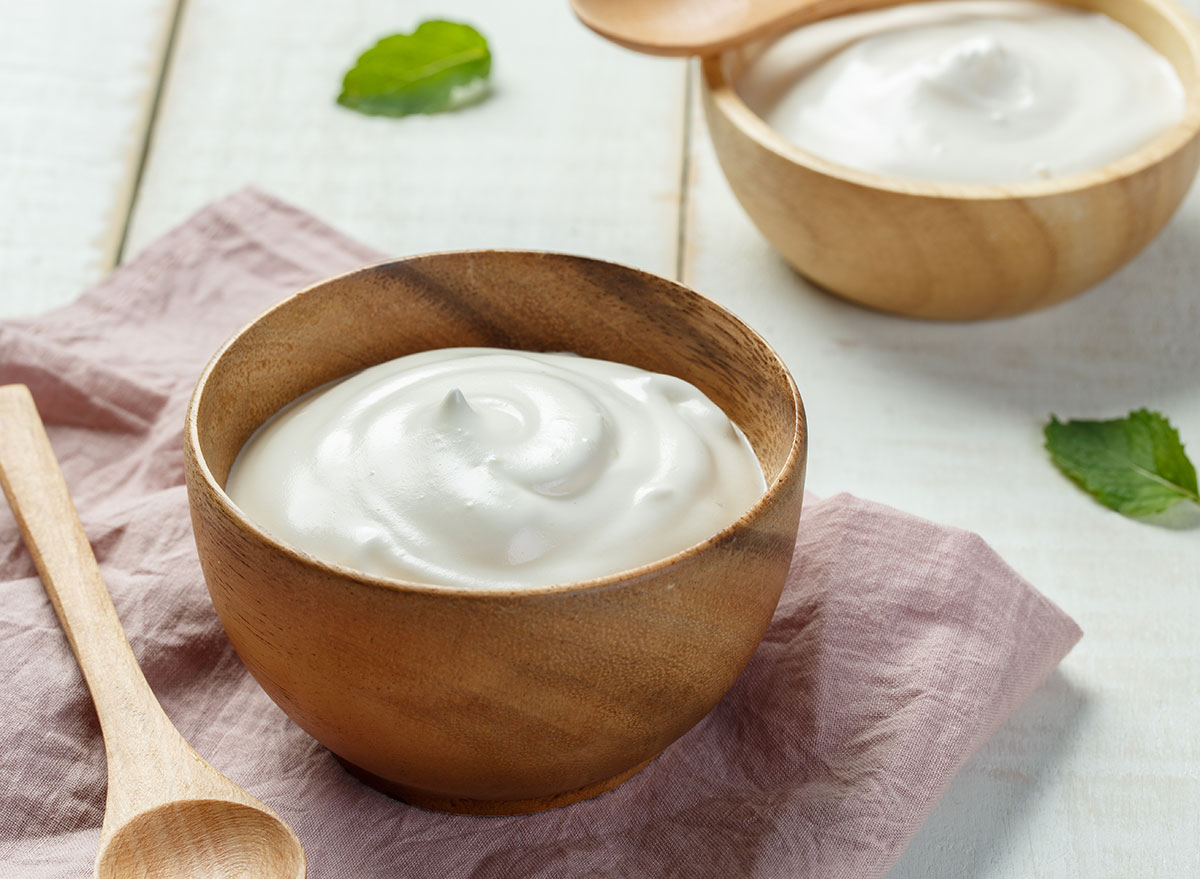
Dairy is also rich in calcium and protein, and it can raise the pH level in your mouth, reducing the risk of tooth decay. But unlike other dairy foods like milk and cheese, yogurt also contains probiotics. These essential microorganisms “help to crowd out bacteria that cause cavities,” says Chris Moffatt, Senior Marketing Manager at Kent Express Dental Supplies. Just be sure to choose plain yogurt with no added sugar, and you’ll be contributing to better mouth health with every spoonful.
Leafy Greens
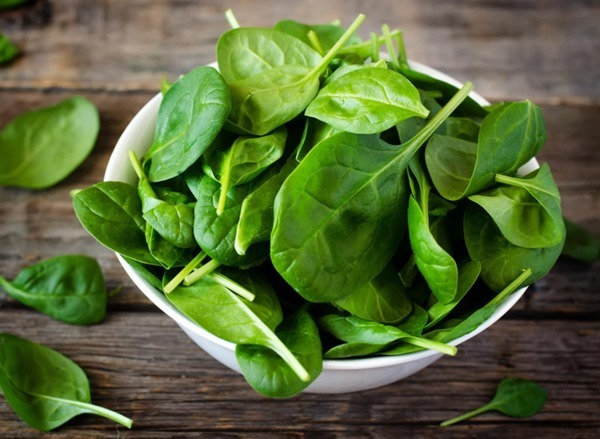
Leafy greens are good for your whole body, but especially your mouth.
“Leafy greens, as well as being full of vitamins and minerals, are high in calcium and folic acid which can contribute to good oral health,” says Moffatt. Dr. Mike Golpa, Director of G4 by Golpa Dental Implant recommends choosing greens like spinach and broccoli that are also rich in vitamin C, which helps protect your gums and reduce inflammation.
Crunchy Fruits and Vegetables
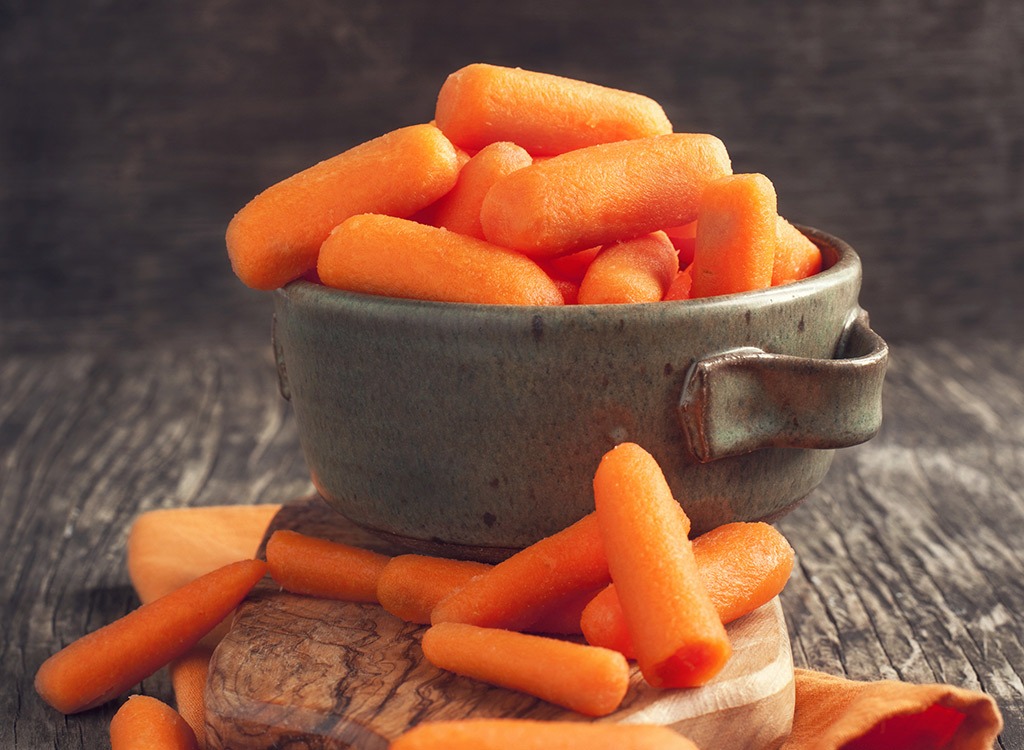
Vegetables that are crunchy and rich in fiber don’t just bring essential nutrients to the table. The mere act of eating them can also improve oral health due to their texture.
“Raw carrots, cucumbers, cauliflower, celery, green beans, and snap peas are ‘chewing foods’ that mechanically clean children’s teeth and gums,” says Sulitzer. “Crisp vegetables have the ability to naturally scrape away plaque that otherwise builds up between meals or that kids miss when brushing.”
And while bright in color, the hard texture of these foods “tend not to stain teeth,” says Lisa Richards, a nutritionist and author of The Candida Diet, “because they are cleaning as you eat them.”
Green and Black Tea

The polyphenols in green and black tea are great for oral health, Moffatt explains, as they interact with plaque bacteria and keep them from multiplying in the mouth.
“Just remember to rinse after drinking so the tea does not stain your teeth,” says Dr. Rajan Sharma, DDS, of EON Clinics Dental Implants.
Nuts
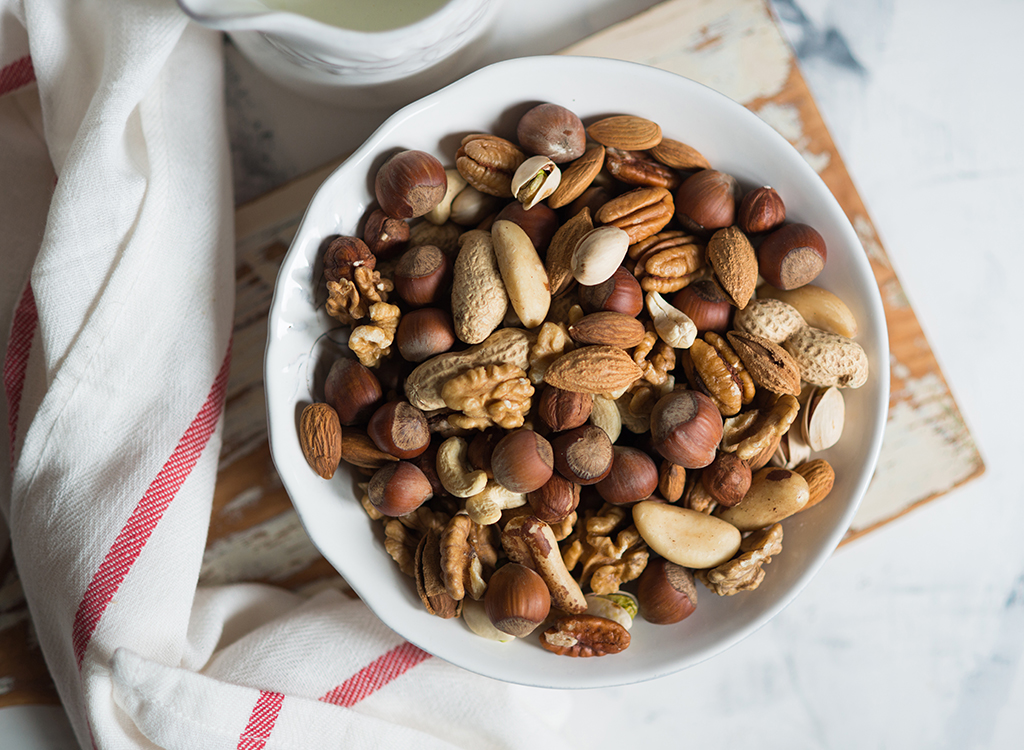
Rich in calcium and phosphorous, nuts are also a great choice for oral health, according to Dr. Jared Cox of Today’s Family Dentistry in Searcy, Arkansas, who recommends almonds, peanuts, and cashews. Sulitzer adds that the natural fats in nuts and seeds “oat teeth and help shield against bacteria.”
“The oils in the seeds help strengthen enamel,” Cox says, “making teeth more resistant to cavities.”
Water
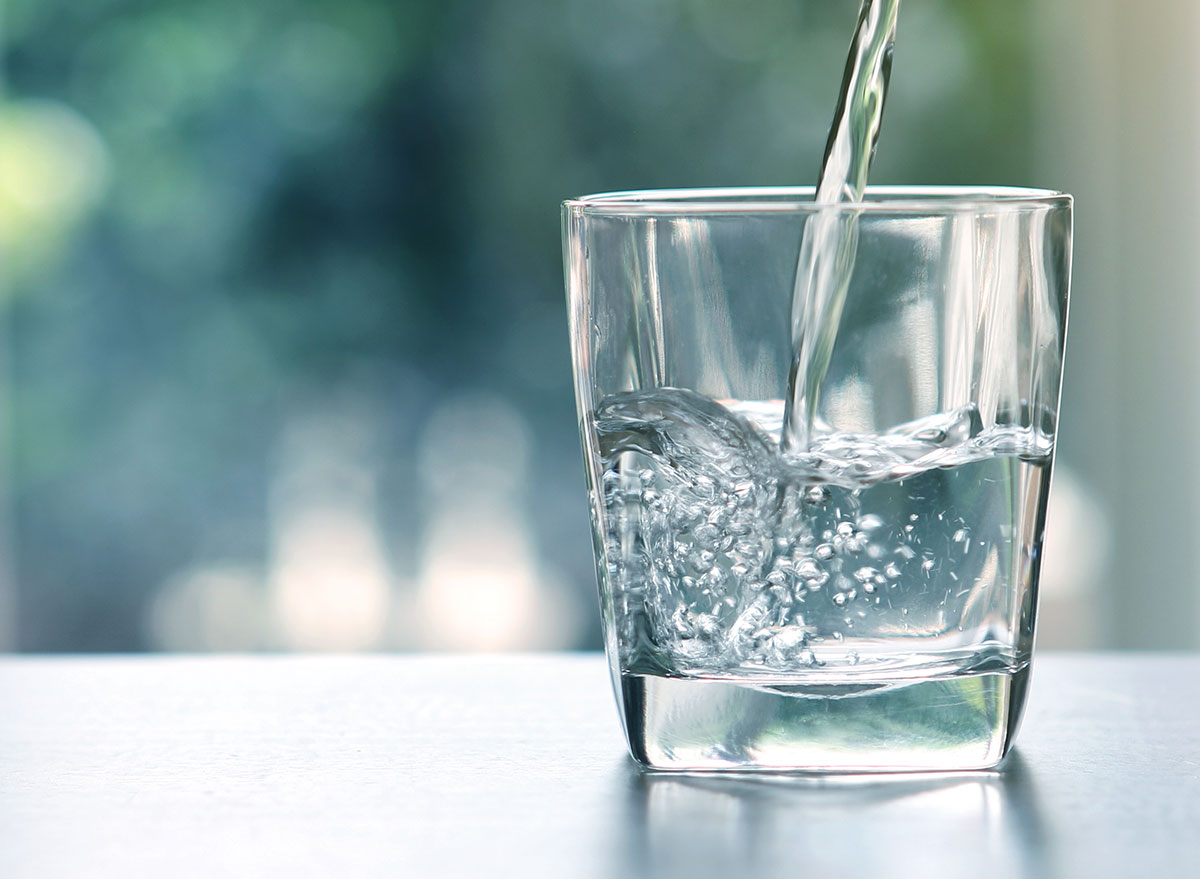
But the very best thing you can consume for your teeth is also the easiest: water.
“It may sound obvious but drinking plain water is good for your teeth,” says Dr. Daniel Atkinson, Clinical Lead at Treated.com. “It helps to wash away any lingering particles that may be present after you’ve eaten.”
Rehydrating, cleansing, and simple, water is a great choice for improved oral health.
And now, the worst foods for oral health.
Candy
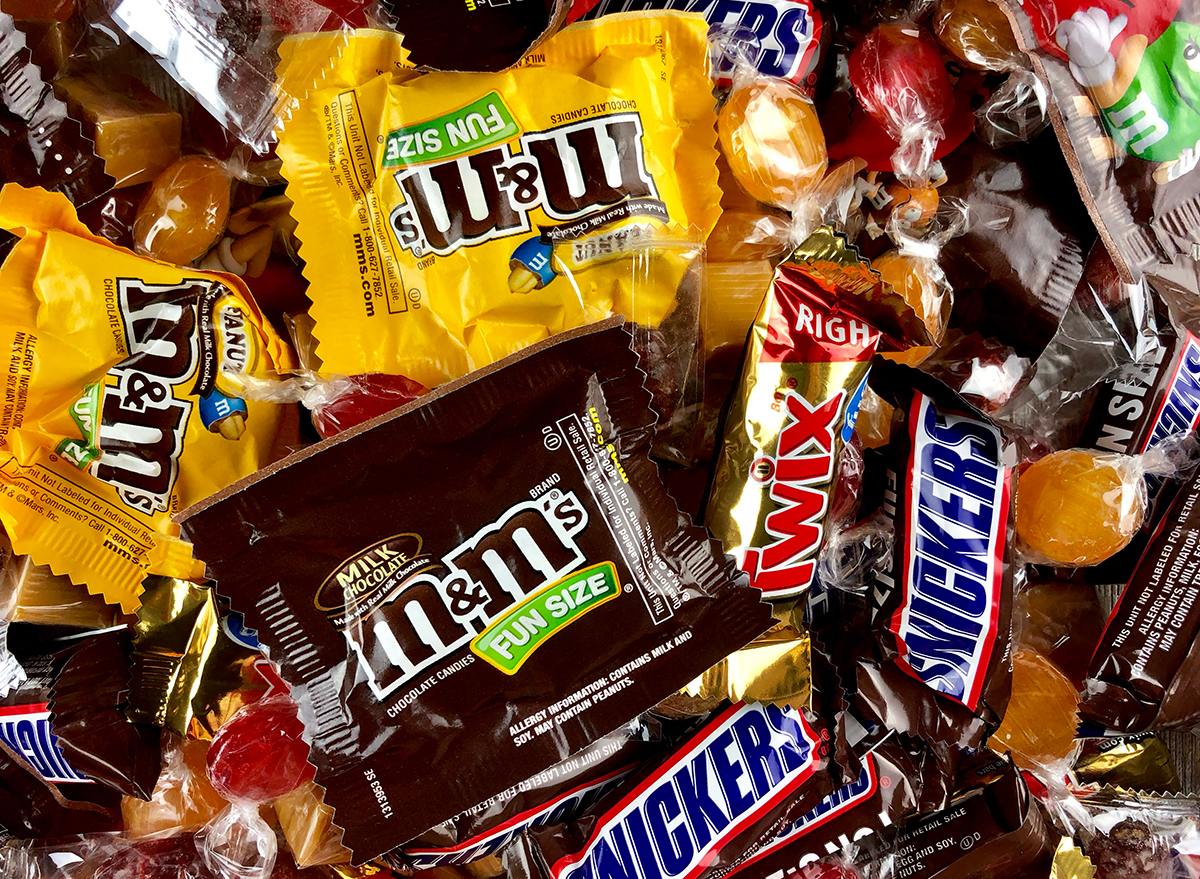
It’s no surprise that candy is a prime culprit for poor oral health. According to Moffatt, “sugary food and drinks are one of the main causes of tooth decay.” And this is due to a number of factors. See when the bacteria in your mouth breaks down sugar, it breaks down acid. This acid damages the tooth’s surface, making it more susceptible to cavities and other problems.
“Anything in high acidity can cause acid erosion and weakening of the enamel, which then can lead to breakage of teeth,” says Dr. Sheehan, And not all candy is created alike. Some are worse for your teeth than others, such as sour candies. Yep, those sour treats from your childhood aren’t doing you any favors.
These candies, explains Moffatt, “contain different acids that are even tougher on our teeth.” Hard candies are problematic as well, explains Dr. Atkinson, due to the strain it puts on your teeth.
“You’re more likely to chip a tooth trying to chew something hard,” he says, “and when a chipped tooth creates a gap it’s easier for other food to get lodged.” But chewy, sticky candies like taffy, caramel, or gummies aren’t great either.
“Candies that are sticky are more likely to cause cavities, because the stickiness will adhere to the teeth, while the sugar will cause destruction,” says Dr. Sheehan. But candy isn’t the only culprit. Other sticky sweet foods like dried fruits can pose the same problem.|
“While foods that are high in refined sugar are bad for your teeth, there are other ‘healthier’ sources of sugar that can damage your teeth and gums over time,” says Dr. Sharma. “Dried fruit, fruit juice and other foods that contain natural sugars can lead to tooth decay if the sugar coats the teeth for an extended period of time.”
“Eating lots of sugary foods can also create small holes between your teeth and your gum line, where food particles can become trapped,” says Atkinson. “This is how conditions like gingivitis and infections, like abscesses, can develop.”
Add to this the fact that sugary foods can cause bad breath by stimulating the production of foul-smelling bacteria, and it’s better to steer clear.
Soda
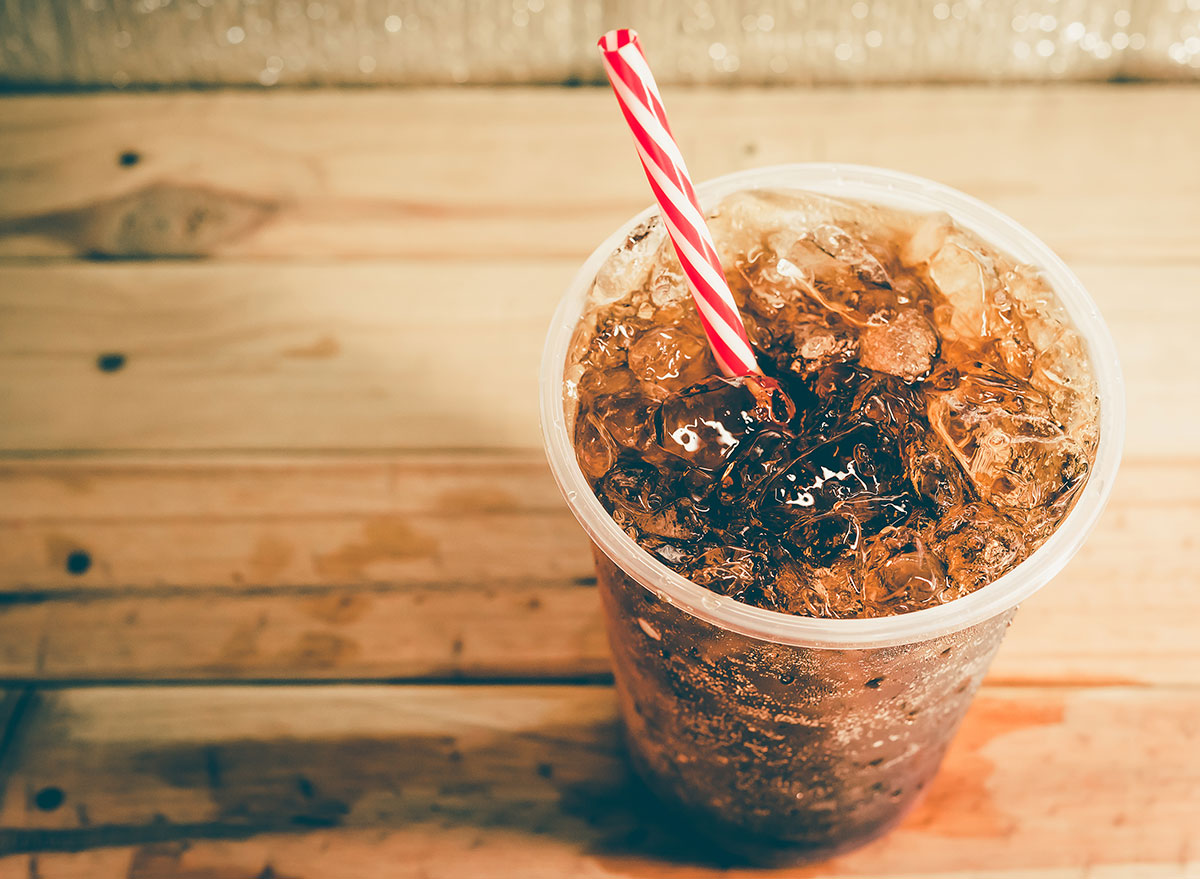
If sugar is bad for your teeth, it’s not surprising soda is. But it’s not just the sugar that gets you with these fizzy drinks.
“Sugary drinks can erode tooth enamel too,” says Atkinson. “When these drinks are carbonated [like soda] this can amplify the effect on the teeth, because they’re thought to react with plaque to increase the presence of acid in the mouth.”
This acid attacks tooth enamel, making the sugary effects of soda even worse for your teeth. Soda truly is filled with way too much of the sweet stuff. Proof? Check out The Sodas With More Sugar Than 4 Donuts.
Bread
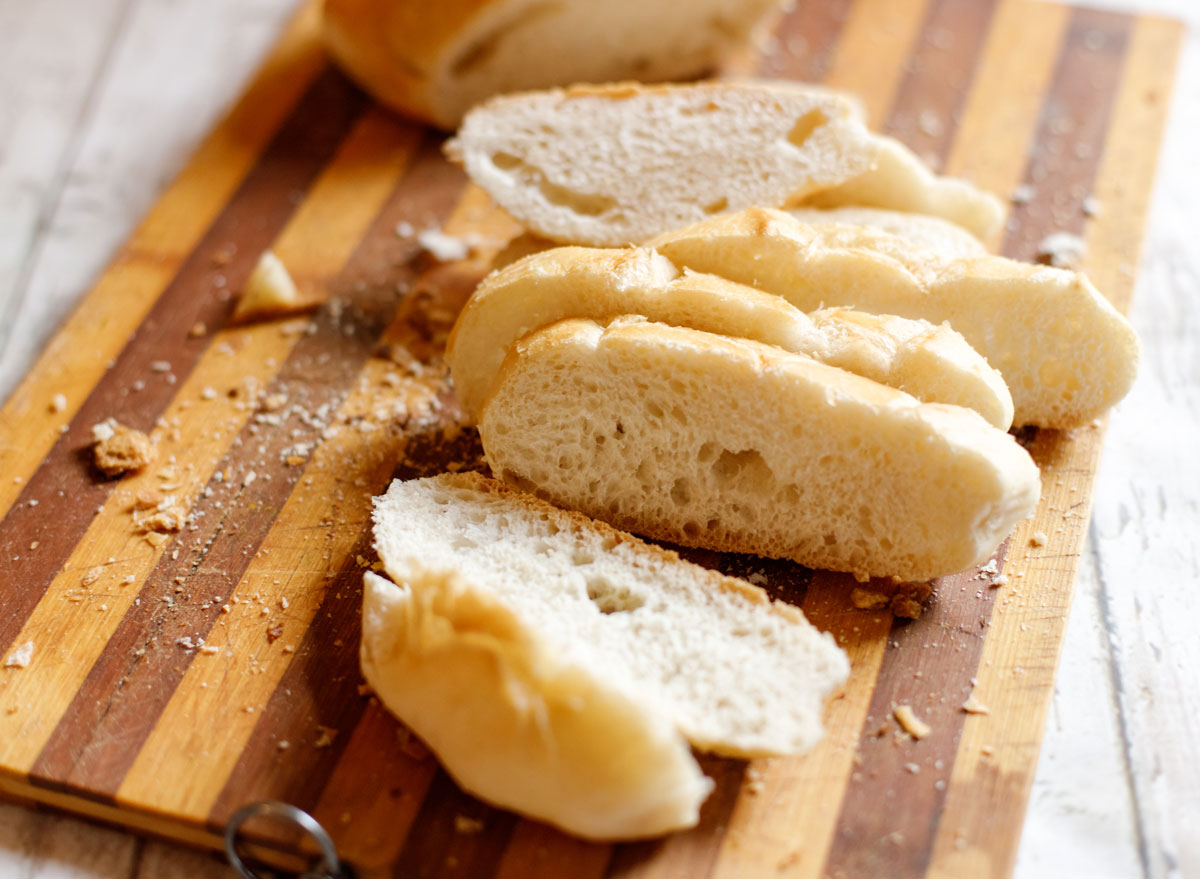
Bread may seem innocuous, but in reality, the starch in bread can be problematic for your mouth.
“Refined carbohydrates are among the worst foods to consume while maintaining oral health,” says Richards, nutritionist and author of The Candida Diet. “Carbohydrates, especially the refined form, are broken down into sugar by enzymes in your saliva. Refined carbohydrates go through this process much quicker which can cause them to essentially become sugar in your mouth and stick to your teeth.”
This is true of any refined carbohydrate, but particularly true of foods that become paste-like when chewed.
“When you chew bread, your saliva breaks down the starches into sugar and transforms it into a gummy paste-like substance, which sticks to the crevices between teeth and can cause cavities,” says Dr. Sulitzer.
He recommends looking for less refined breads, which contain fewer added sugars and are better both for your mouth and for your overall health.
Potato Chips
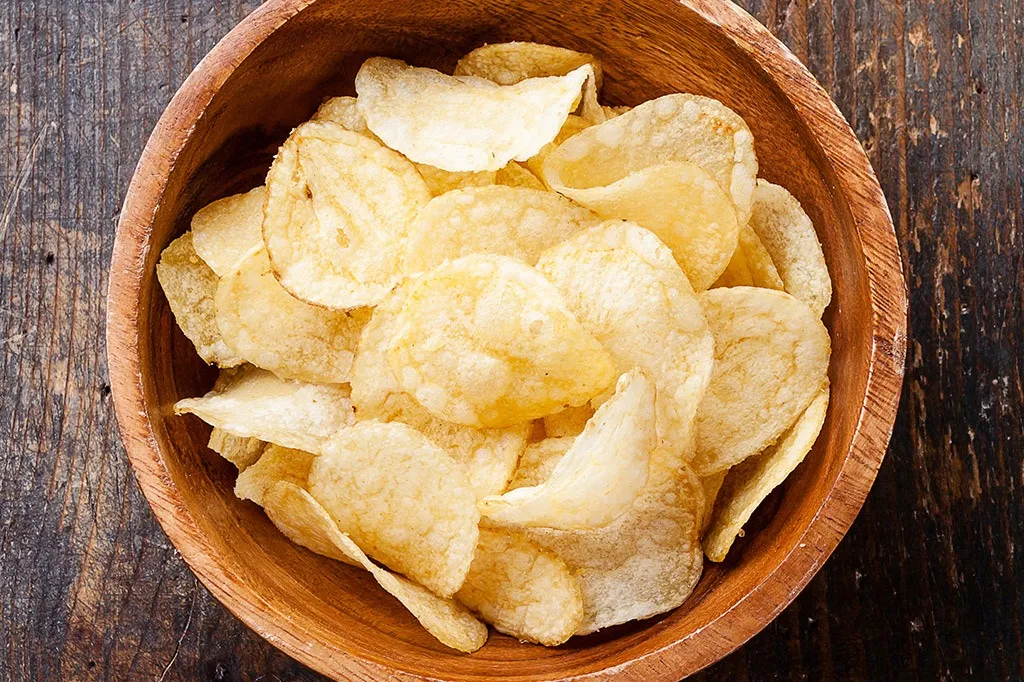
Other starchy foods pose a similar problem as bread, but this is particularly true of crunchy foods like potato chips.
“Aside from the fact that they can turn into a hard mound that sticks in the crevices in your teeth, they’re also high in starch, which the enzymes in your mouth will turn into acid [which in turn causes tooth decay],” says Atkinson. “Any food that can get trapped between your teeth can be easy to miss when brushing your teeth and the longer it stays there, the more likely it is to give you halitosis (bad breath), because of the bacteria that develops as a result.”
Coffee
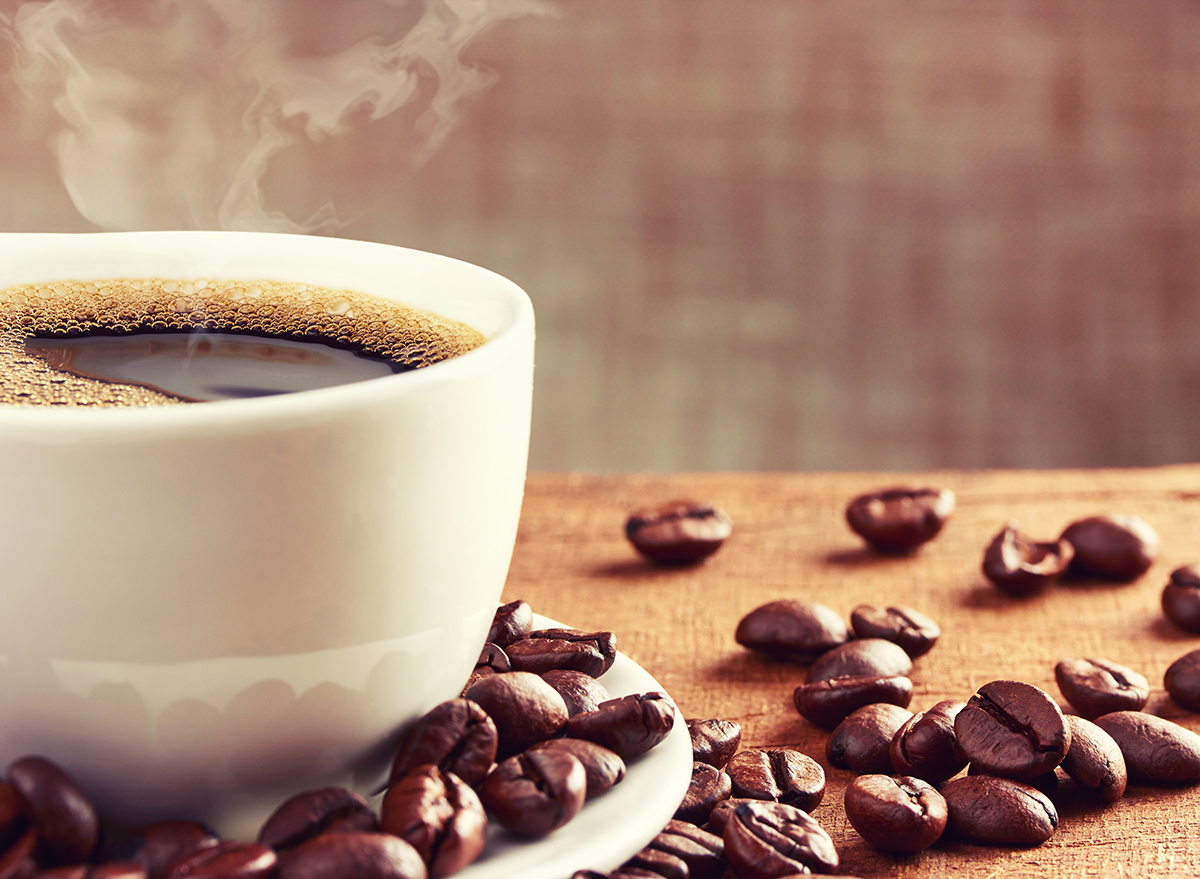
Along with beets, soy sauce, and red wine, coffee is a prime culprit for tooth staining. But that’s not the only reason coffee contributes to poor oral health.
“Coffee can dry the mouth, producing bad breath by allowing bacteria to flourish without saliva washing it away,” says Moffatt. And adding creamer to that coffee makes things even worse.
“The biggest issue with these coffee creamers is that they’re jammed full of sugar, and many of us sip our coffee throughout the day or have multiple cups,” says Dr. Andrea Santo, DMD, of Lakeview Dental of Coral Springs. “This is essentially the same as consuming other high-sugar drinks all-day and bathing our teeth in the sugary substance.”
Drink water after coffee or red wine to reduce some of these downsides of the dehydrating beverages.
Onions and Garlic
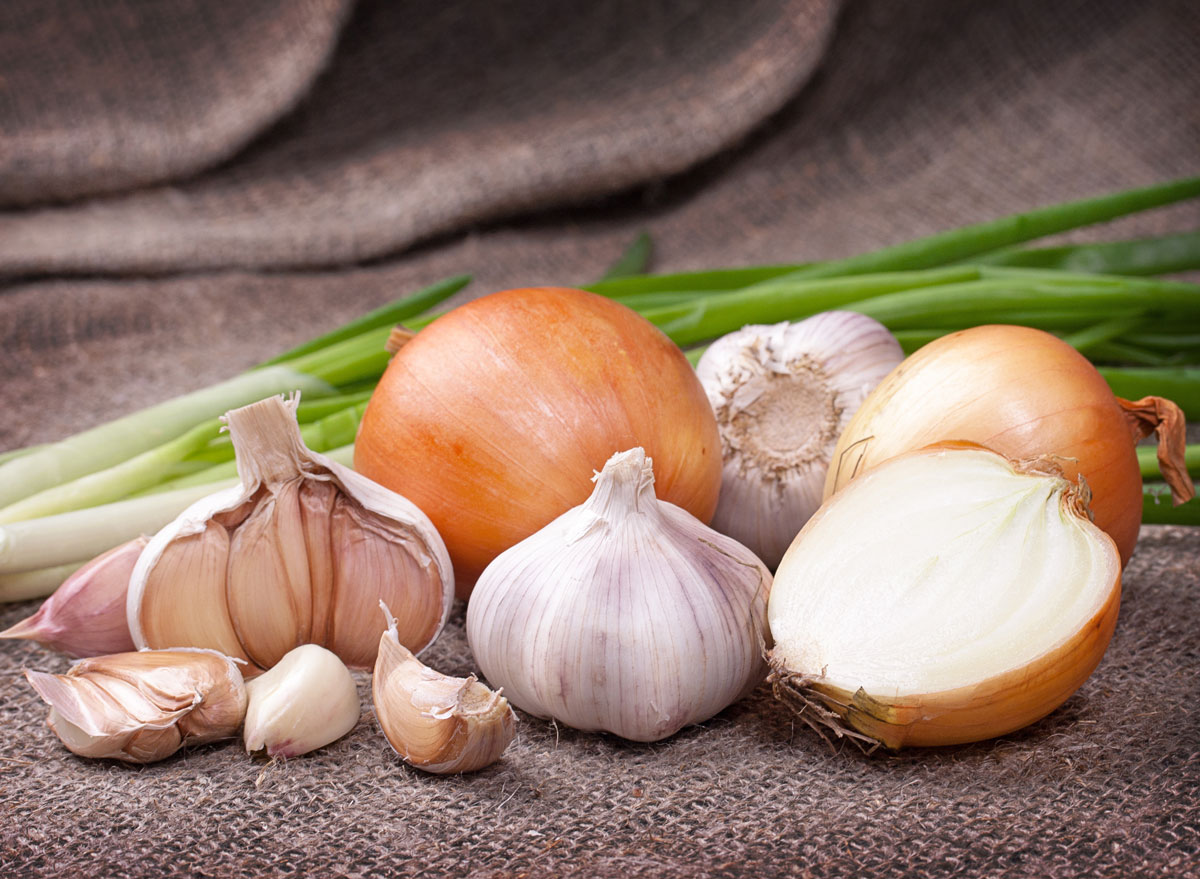
Onions and garlic contribute to bad breath in more ways than one. Not only are they strong-smelling substances on their own, but, Dr. Golpa explains, the compounds in the veggies also linger in your body.
“They contain sulfuric compounds that get absorbed into your bloodstream, then go into our lungs to come back with odor through the mouth,” he says. While this isn’t necessarily bad for oral health on the whole, it does mean that bad breath stays with you long after brushing your teeth.
